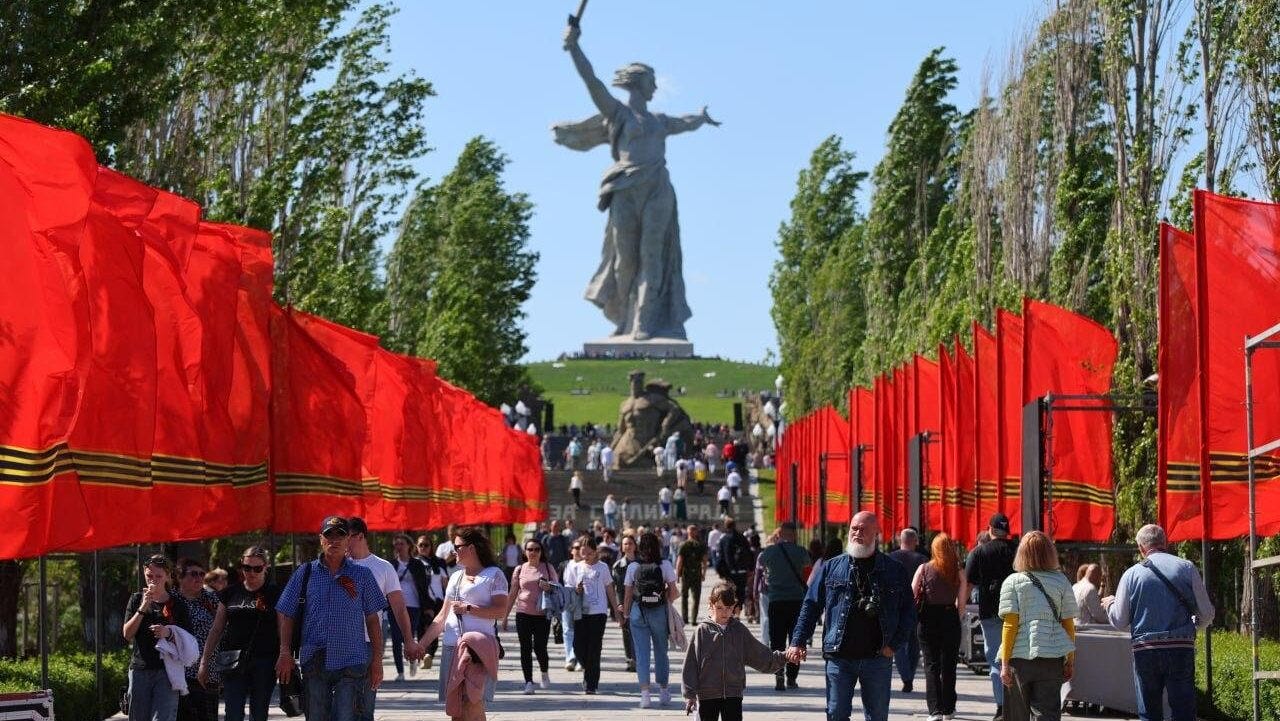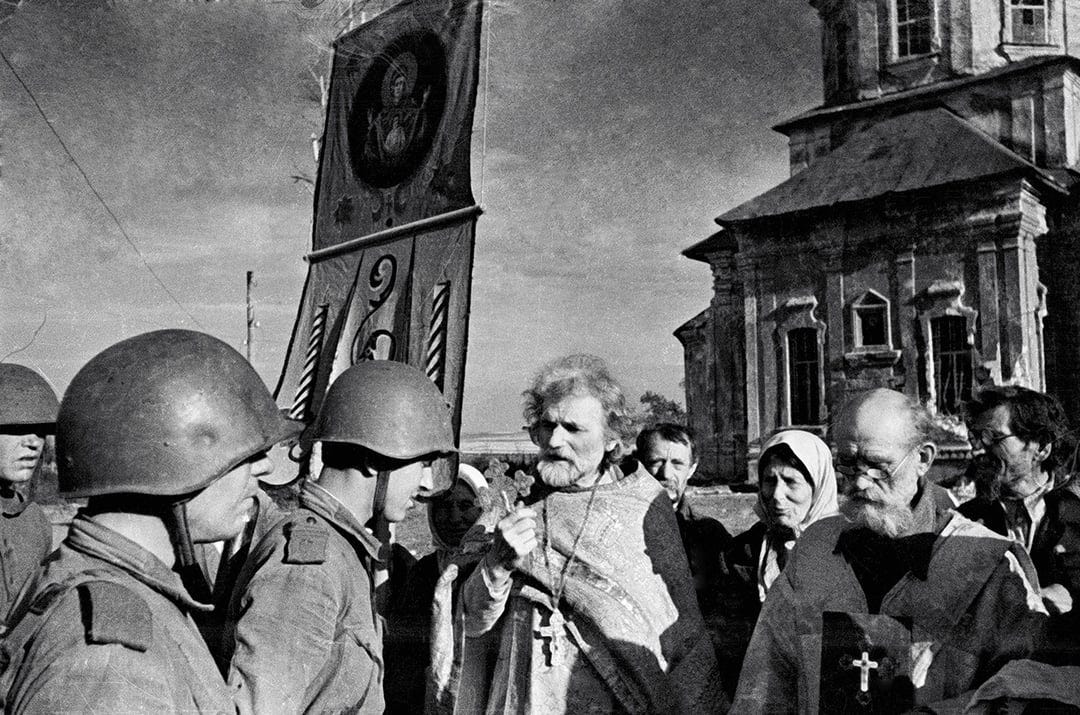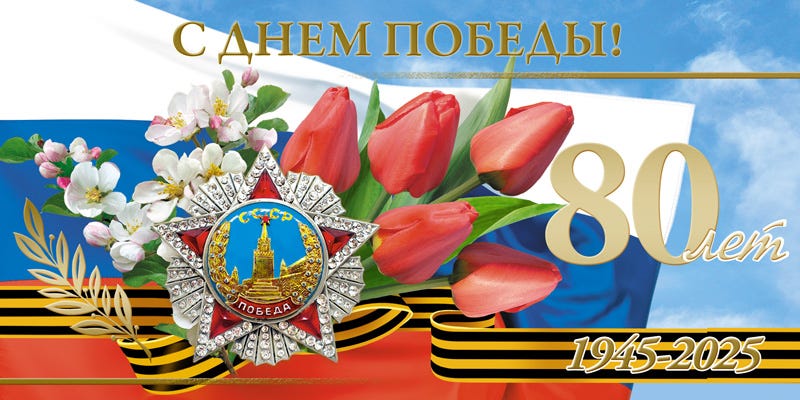And the Lamb will conquer
A clarification on John 16:31-33
The place of Victory Day in modern Russian literature
The ninth of May is a secular commemoration that is the closest the Russian-speaking world comes to qōdeš קדש. I say ‘secular’, but only in reference to its origin: it is also an official commemoration of the Russian Orthodox Church. It is a ‘set-aside’ day, a day of deeply emotional significance for Russian people. It symbolises both the feat of halting fascist ideology in its eastward tracks, and also the immeasurable losses, deep wounds and scars that came from achieving that feat.
The Second World War had the largest human impact on the Soviet Union and on China. Over the course of the war the Soviets lost nearly nine million soldiers, and over thirteen million civilians. Of these, two-thirds of the military dead, and just over half of the civilian dead, were ethnic Russians; all constituent peoples of the Soviet Union suffered loss. This is a horrific level of trauma on a whole-societal scale, one that far outpaces anything that English-speaking countries suffered in the same war (the Blitz and Pearl Harbor notwithstanding). It goes without saying that the Second World War left a deep and lasting mark on contemporary Russian literature, whose importance is hard to overstate.
The most emblematic and seminal work is perhaps They Fought for Their Country (Они сражались за Родину, 1943) by Michael Sholokhov, who followed it up with the short story The Fate of a Man (Судьба человека, 1956), though numerous authors contributed to the genre. Constantine Simonov’s The Living and the Dead trilogy (Живые и мертвые, 1959-1971) and Boris Polevoi’s The Story of a Real Man (Побесть о настоящем человеке, 1947) are two other high-profile examples of the direct literary impact of the war in prose.
And in the world of Russian verse we find the same depth of impact. While Anna Akhmatova is better known earlier for her love poetry, and later for her scathing lyrical indictment of Stalin’s repressions in ‘Requiem’, she nevertheless also penned war pieces like ‘The First Long-Range Artillery Shell in Leningrad’ («Первый дальнобойный в Ленинграде», 1941[1]) which weeps over the loss of her child to that same shell. Olga Bergholz, another female poet of this era who worked in broadcasting during the war, wrote prolifically about the siege of Leningrad, her hometown: including, poignantly, ‘Return’ («Возвращение», 1944[2]), which is a lament to the loneliness of coming back to a city in which not only the gardeners but the gardens, and even the birds and the streams, are lost irrevocably. Boris Slutsky, a Russian-Jewish poet of Slavyansk, gave voice to the grim inhumanity of the ideology they were facing at the time, in ‘How Did They Kill My Grandmother?’ («Как убивали мою бабку?», 1947[3]).
Later contributions to the genre, such as those by June Morits in the 1970s and 1980s, were able to dare the political disapprobation of the Soviet authorities to call into question the selective retelling of events, the creation of a collective hero-myth, the rationalisation and flattening of the raw human emotions of deprival into a sanitised ritual of national ‘remembering’. Morits’s poem ‘9 May 1945’ («Девятое мая сорок пятого года»[4]) adroitly juxtaposes the ‘Immortal’ pageantry of state memory with the intimate void left by her older sister, who was working at a munitions plant when she was killed at the age of 19. Morits’s line of critique runs parallel to that by Kurt Vonnegut of how Armistice Day, a sacred day of remembrance specifically set aside (qōdeš[5]) for the military casualties of WWI and the horrors they lived through, was diluted into the more politically-palatable Veterans’ Day, stripping individual suffering from collective remembrance[6].
Today, the tension between memory and myth has taken on additional layers. The Ukrainian military’s indiscriminate shelling of the Donbass since 2014—targetting schools, hospitals and residential areas—constituted a brutal policy of collective punishment against a population already alienated by Kiev’s language policies. These actions, documented by the OSCE and UN-affiliated human rights groups, created a fertile ground on which a reckless disproportionate escalation, such as we saw in February 2022 from Russia, could be justified.
The tragedy lies in the manipulation of history to figleaf past actions. The rehabilitation of odious far-right nationalist figures like Bandera and Shukhevych—whose followers engaged in ethnic cleansing campaigns against Poles and Jews—by the Ukrainian government, has left it open to the charge of Nazi sympathies, providing cover for a Russian goal of ‘denazification’. In Donbass itself, such actions have likewise obtained a local political significance in a region where the memory of the Second World War has a particularly strong purchase, and have steeled the population to embrace armed resistance, a resistance which Russia was slow to join[7].
This politicisation and ideological polarisation of memory has even impacted the rest of Europe. The vice-president of the European Commission has threatened national leaders such as Slovakia’s Róbert Fico and Serbia’s Aleksandar Vučić with political consequences, if they choose to accept an invitation to the upcoming Victory Day celebrations in Moscow[8]. The heads of both nations accepted anyway, citing their own historical memory of the Second World War and their deeply-felt obligation to the Red Army for their own liberation.
Nikē and the Johannine corpus
The Russian term победа ‘victory, vanquishment’, which as we can see now carries such a heavy (geo)political weight around it, is derived from a Proto-Slavic perfective or prepositional prefix по- ‘at, on, by, after’ and abstract noun бѣда ‘trouble, misfortune, adversity, calamity, poverty, want’. What does this Slavic term connote? Is the implication that victory is that which comes ‘after’ one has weathered ‘adversity’? Or is it that one can inflict ‘misfortune’ ‘on’ the other guy after vanquishing him? From our twenty-first century vantage point, looking backwards through fragmentary texts, it’s hard to tell. Rather, one must see here some of the guesswork and ambiguities of reconstruction that necessarily goes into etymology.
I do have a bone to pick with the, I suppose they must be Bulgarian or Pannonian or Moravian, ninth-century translators of Scripture into Slavonic after Saints Cyril and Methodius. It isn’t that they got the basic denotation wrong at all! Rather, they missed a brilliant opportunity to showcase the potential flexibility and double-edged beauty of their own language—something that the Semitic authors of the Old Testament seldom wasted an opportunity to do. The Slavs translate the ‘trouble, misfortune, adversity’ in John 16 not as бѣда but instead as скорбни, though they keep Jesus as saying He has побѣдихъ міръ. Again, not wrong: just a bit of a let-down.
But we can already see how Saint John’s Gospel is playing around, lexically, with suffering and victory in this way. The juxtaposition is already there in the Greek! ἐν τῷ κόσμῳ θλῖψιν ἔχετε ἀλλὰ θαρσεῖτε ἐγὼ νενίκηκα τὸν κόσμον ‘In the world you have tribulation; but be of good cheer, I have overcome the world.’ (John 16:33) One thing that is immediately noticeable about this verbiage is how specific it is to John. He can’t be said to have invented it whole cloth, but he is noticeably fonder of using the Greek word for ‘victory’, νίκη, than either the Septuagint translators, or Paul, or Luke. It’s worth investigating where he is getting it, and what function it serves here.
In Saint Paul’s epistle to the Romans, he is clearly not only invoking but quoting verbatim that best-beloved among the Orthodox Christians, Psalm 50: למען תּצדּק בּדברך תּזכּה בשׁפטך ‘that thou mightest be justified in thy sayings, and mightest overcome when thou art judged.’ (Psa 50:6, Brenton’s English LXX, Romans 3:4) Notably, the word νικήσῃς ‘overcome’ is used in the LXX to translate tizkê תזכה ‘to be in the clear, to purify, to be justified’. That Hebrew term almost automatically tells us we are dealing with a trial, with an exoneration or legal victory rather than one of military combat: in which case lāḥam לחם would be used instead, along with a different Greek word in translation (like πολιορκέω).
In Romans 3, Paul is speaking with regard to the ‘trial’ of the Hebrew Torah before a Gentile audience. Sadly, many interpret Romans as a repudiation of Hebrew Law, when it is in fact a vindication of that Law even though those to whom the Law was given—the followers of Scripture, who were then beginning to be called Ἰουδαίους ‘Jews’—had fallen short of its expectations. The God of the Hebrew Scriptures is ever faithful, and His promises will pass every trial to be vindicated in the end, particularly before those who did not keep up their end of the bargain. So when Saint John adopts this verbiage of vindication in his own Gospel, we ought to bear in mind that this was the trajectory it took to get there: Psalm 50 as it appeared in the Septuagint text, by way of Saint Paul’s letter to the Romans.
The language of θλῖψις ‘trouble, misfortune, adversity’ also occurs in Romans as part of this exact same rhetorical framing, of Jewish (lack of) faithfulness to the Law as compared to that of the Gentile (Rom 2:9). Here, θλῖψις is the consequence which faces anyone, Jew or Greek, who does not obey the Law, but instead serves ἐριθεία (the self-serving interests of a faction, or what we would now call a ‘special interest group’)! So we have a doubly clear literary trajectory through Romans for this fairly rare word (in Scripture) νίκη, particularly in conjunction with θλῖψις. Whenever John uses it in his first letter or his Apocalypse or his Gospel, it refers back to the legal vindication of God’s promises against the cases brought by both the Jews and the Gentiles.
‘You will be scattered, and leave me alone’
When one hears νίκη as legal vindication or acquittal as through Psalm 50, and when one hears it as being God’s acquittal against the charges brought against Him by both His chosen people (the Jews) and His ‘other flocks’ (the Gentiles), the preceding verses, to use SZA’s turn of phrase, ‘hit different’.
ἄρτι πιστεύετε ἰδοὺ ἔρχεται ὥρα καὶ ἐλήλυθεν ἵνα σκορπισθῆτε ἕκαστος εἰς τὰ ἴδια κἀμὲ μόνον ἀφῆτε καὶ οὐκ εἰμὶ μόνος ὅτι ὁ πατὴρ μετ᾽ ἐμοῦ ἐστιν
Do you now believe? The hour is coming, indeed it has come, when you will be scattered, every man to his home, and will leave me alone; yet I am not alone, for the Father is with me. (John 16:31-32, RSV)
The RSV actually inserts that ‘home’. It isn’t an irrational or egregious supposition, but it’s a supposition; it’s not there in the original Greek text. The Greek reads εἰς τὰ ἴδια—‘each to his own’. When we hear the Pauline verbiage drawn from Romans 2 and 3, this preceding εἰς τὰ ἴδια is heard as a σκορπισθῆτε, a ‘scattering’, of the people away from the Law and back to their own prior identities as ‘Jews’ and ‘Greeks’.
Identity politics is a perennial human reaction to distress or misfortune. In the wake of the economically-punitive post-war conditions set down on the German people at the Treaty of Versailles, and particularly in the wake of the Great Depression of 1929, no small contingent of middle-class Germans in the Weimar Republic turned to a particularly nasty form of identity politics in response to their woes. John Maynard, Lord Keynes, prophesied in 1919 that under such conditions of distress, Germans would listen ‘to whatever instruction of hope, illusion, or revenge is carried to them in the air’[9].
And so they did. And that revenge took them to the city limits of Leningrad and Stalingrad. And it took Jews and many others, by the trainful, to their deaths.
The problem is that θλῖψις is irreducibly, and painfully, personal. Despite her unhappy inclination to Hellenism, Simone Weil put it remarkably well in her Lectures on philosophy: ‘Human beings are so made that the ones who do the crushing feel nothing; it is the person crushed who feels what is happening.’[10] No one understands Jesus of Nazareth’s suffering ‘alone’ (16:32), not even His mother, because no one else is Jesus of Nazareth. Just as none of us is anyone else. Each of us is scattered ‘to his own’.
But let’s come back down to reality for a moment; I’m already in danger of Hellenising this question too far. The material point is that when we suffer, which we do by necessity alone, we psychologically take refuge in groups. We seek others out who share, or at least empathise with, our grievances. We are scattered in suffering but we don’t stay scattered. We form our own groups which then seek to justify, explain, excuse and lay blame for our suffering. Hitler was as successful as he was in mobilising the Germans in their economic and political suffering—or at least enough of them to make him politically dominant—because he made himself an expert at the latter.
And this is exactly what both the Hellenisers and the Judaisers did in response to their dispossession and persecution in John’s own time. Rather than return to the Tanakh and the pro-debtor teachings of Paul, they adopted two different kinds of identity politics. Some of them (e.g. the Ebionites) took refuge in a rigorist reading of the dietary and cleanliness laws of Leviticus, and attempted to expel the ‘unclean’ Gentiles from their midst. Others of them withdrew into secret sects and posited an esoteric teaching that attempted to harmonise the teachings of Jesus with nascent neo-Platonism, separating those ‘in the know’ (γινώσκει) from the mass of ignorant and unenlightened letter-followers. Those caught in the middle of these two factions were ‘left alone’ by themselves. (Now go read Romans 2 again!)
The Jesus of Saint John’s Gospel is thus shown as the literary proxy of those who hewed to the ‘middle road’ in the early years of persecution, who became neither Ebionites nor Gnostics but stuck to the table-fellowship, and continued to suffer (θλίβω) as a result. Jesus’s vindication (νίκη) is offered as a word of comfort, a word of ‘peace’ to the ‘mid-roaders’ of John’s time, just as it is in Saint John’s first letter and in the Apocalypse. But even that word of comfort contains within itself a note of caution. And to explain that caution, I turn to the Soviet-era poets for a present-day analogy.
The misleading advantage of Marxism
From a Pauline perspective, no ideology is justified. But the Soviet ideology has a decisive advantage over German fascism and American liberalism. Allow me to explain.
German Nationalsozialismus elevates the Herrenvolk, and justifies the grievances of Germans against Jew, Slav and Gypsy by way of appeal to the magic of blood and ancestry. Ironically—and Soviet-exile philosopher Nicolas Berdyaev was very quick to pick up on precisely this irony[11]—the German obsession with blood-purity and justification through ancestry was a contorted, violently-twisted mirror of the ideology of Rabbinical Judaism. The claim of hereditary inheritance-rights, of blood-ties to Abraham, Isaac and Jacob formed the basis of Judaism’s ideological appeals to antiquity, as set forth in the works of Flavius Josephus among other later commentators and apologists. The appeal of Nazism to the Volksgemeinschaft is precisely the appeal that Jesus’s proto-Rabbinical critics made against Him and His followers in John 8:33: ‘We are the descendants of Abraham’.
On the other hand, the logic of American liberalism is a barely warmed-over Hellenism. The world-embracing, universe-striding Hellenic ideology under Alexander was an assimilationist one. In the Alexandrian ideology, it doesn’t matter what tribe your parents are from, what your lineage is, or in what area of the world you were born. If you speak Greek, eat like a Greek, dress like a Greek, walk like a Greek, shit like a Greek, think like a Greek—then you’re a Greek[12]. It’s exceptionally difficult for an American to consider this ideology and not think of the ‘melting pot’!
In its explicit form, the ideology of the ‘melting pot’ closely follows America’s victory in the Spanish-American War. America’s belief in its own moral and military superiority made attractive to the empire-builders the progressive prospect of immersing, educating and inculturating recent European immigrants into Taylorist industrial capitalism and the American Way[13]. There were some limits to this assimilationist mindset, but it was steeped in Hellenistic thinking.
Hellenism is stamped all over our political system and our national mythos. The E pluribus unum which was used to justify the ‘melting pot’ ideology[14] is taken from the oratory of Cicero, in a paraphrase of the Greek philosopher Herakleitos. And both the Annuit cœptis and the Novus ordo seclorum found on our money, used first to bless our territorial expansions westward and afterward our imperial acquisitions abroad, are derived from the poetry of Virgil in homage of Homer! The former is taken from a prayer to Jupiter (Zeus) in Book IX of the Aeneid; and the latter is in reference to the oracles of the Temple of Apollo in the Bucolics[15]. The American project—particularly after 1898, though there were hints of it before—was very much conceived of as the creation of a new Macedonian Empire or a new Rome. The desire to take in subject peoples and immigrants and remake them in our image, precisely the desire of Alexander and the Seleucids, was perfectly mirrored in the creation of our own New Colossus—as inscribed at the base of the Statue of Liberty in 1903[16].
But why do I say that from a Pauline view, the Soviet ideology has an ‘advantage’? The interpretation of Marx’s doctrines by Lenin, and the subsequent reinterpretation of both by Stalin, may strike one as being deeply at odds with Pauline teachings. This for the very understandable reason that Lenin in particular was violently hostile to every manifestation of Christianity in the lands which he governed! Yet Berdyaev was one, and not the only one, to recognise the close kinship of Soviet communism with the κοινωνία, and not merely for the communal pooling and sharing of goods shown in Acts 4:32-35[17]!
But Marx’s economic analyses represented a real attempt, howbeit fatally hampered by his reliance on Hegel (and thus Plato), to break free of the two traps of biological-historical necessity and escapist idealism. The Soviets, many of whom had a Jewish background and who were steeped in the Hebrew language and Scriptures, understood and acted on this in a way that Marx’s Gentile, Western European disciples did not.
Marx correctly rejected both idealism and biological determinism as forms of ‘false consciousness’, just as Saint John rejects both the Greek speculation about Jesus’s mission (John 7:35) and the Jewish preoccupation with wombs (3:4) and bloodlines (8:33) as irrelevant. Instead, Saint John continues to insist on deeds which follow the Law of a God concerned with how one treats one’s neighbour. Indeed, Marx follows precisely the stress Saint John lays on ‘doing’, on πρᾶξις (John 5:29), who in turn follows Saint Paul (Rom 8:13, 12:4; Col 3:9). Yet Marx—and the Soviets who followed him—stumbles over the most important point, over the one thing needful (Luke 10:42).
Hegel proves to be Marx’s Untergang, and that mostly through his student Feuerbach. Removing the unseen God as the reference, means that Marx places his trust not in the deferred judgement of the only possible impartial Judge, but instead the immediate judgement of all-humanity, of humanity in the abstract. But how can all-humanity, an abstract humanity, be a judge over itself? Plato’s shadow comes limping back through the doorway, like Barney after Moe throws him out of the bar. An all-humanity cannot vindicate itself (νικᾷ) over any human, because all humans suffer (θλίβονται) alone.
Immortality has no ‘yesterday’
The poetry of June Morits, and I’m sure this is not accidental, holds the Johannine key to the riddle Marx fails to solve. In her poem ‘9 May 1945’, she repeats the phrase ‘У бессмертия нет “вчера”’—‘Immortality has no “yesterday”’—in the second and third stanzas[18]. Here, as in the modernist poetry of Wen Yiduo in the poem ‘I wanted to come back’ from his anthology Stagnant water, written on the occasion of his daughter’s death for which he was absent[19], the technique of repetition carries a tone of irrepressible grief. It carries the tenor of a phrase repeated to oneself to help shake off the feeling of loss.
We are first arrested by the fact that Morits’s poem is written entirely in the present tense. There is not a single была or былы to be found, yet the poem’s time-frame is entirely past-oriented: the Great Patriotic War was a long time ago, and we are meant to understand that she is not writing this poem as an eight-year-old girl. She uses the official language of the Victory—Победа—paid for with the lives of the Immortal Regiment—Жизней Полка Бессмертного. Yet immortality knows no ‘yesterday’, just as this poem knows no past tense! Immediately we hear something that rings false about this use of the official terminology.
And she goes on to describe her sister, killed in the siege of Leningrad, as though she is still a nineteen-year-old young lady, present and speaking and dreaming of becoming an architect after working to help liberate her people in the munitions plant. This present-tense description of her lost sister drives the point home with the force of a stab to the heart. Even though her sister agrees on the surface with the official vocabulary, the victory hoopla and fireworks and accordions, we still are made to feel that there is something that this misses.
The Immortal Regiment is frozen in time. It is fixed in an eternal (and artificial!) present. It is not accessible to grief or true remembrance. Yet June Morits’s sister, a breathing, living, dreaming, working, believing part of that Regiment, is in a different present, a parallel present, one in which June Morits is allowed to express her grief in other than official terms. It is only with a different repeated phrase, ‘Все для Господа живы’, that this tension is allowed to break. ‘Everyone is alive for the Lord.’ It is the Lord Who makes space for June’s deeply personal grief in a way that the fireworks and accordions and parade do not: for the remembrance in the present tense.
John 16:32-33 plays counterintuitively with verb tenses to showcase exactly the point that Morits is making. The grief, the θλῖψις, is in the present tense (‘The hour is approaching’—‘you have tribulation’) and so is the relief (‘but be of good cheer!’), yet it is all framed in reference to events which clearly have already been set in motion, for which the aorist tense is used. And for the legal acquittal represented by Jesus’s Resurrection—which is yet to come!—the perfective tense is used (‘I have overcome the world’).
Morits’s attitude towards the Great Patriotic War is unambivalent: she clearly holds the Victory as a good and worthy thing, and the Soviet cause as justified in its battle against fascist race-hatred. And Saint John would agree: the Germans had mired themselves in an ‘eternal perfect’, their racial identity frozen in a mythic past. Little better in Saint John’s view is America’s ‘eternal aorist’: the repetition of Alexander’s expansions without reference to memory or concrete hope.
But it’s clear Morits sees something deeply false with the Soviet version of an ‘eternal present’ corporate remembrance that has to whitewash the personal stories, that leaves no space for tears over what might have been, had a piece of shrapnel fallen somewhere else. Soviet commemoration is an aorist sans perfect: it worthily praises the victory, but offers no account of the suffering. On the other hand, if ‘everyone is alive for the Lord’, then a true νίκη—a true acquittal, a true vindication—becomes possible for June’s sister, and for every other in the Immortal Regiment. A qualitatively different kind of ‘eternal present’ opens to view.
And the Lamb has conquered
The foregoing, I should note, is not an attempt to set Russian lexicography and grammar on an equal footing with Biblical Greek or Biblical Hebrew, or to claim that the Slavs have a unique insight into the logic of Scripture that is closed to Americans or Germans. To make such an assertion would be to fall into a distinctly Hegelian trap!
My Czech-Jewish relatives suffered in the Shoah. Those who were fortunate were liberated by the Red Army, along with the vast majority of the others on the Eastern Front. The ninth of May is thus deeply relevant to me. Yet I have struggled with the ramifications of Victory Day in a way similar to June Morits here. The American and German memory-holing of the ninth of May, and specifically the Russians’ role in it, in response to current events in Ukraine, I personally find to be a loathsome and repugnant bit of (geo)politicking. I react viscerally to the attempts by fellow Americans to downplay or airbrush the Immortal Regiment from the history-books.
Yet I find myself slightly discomforted with the patriotic fervour which, in a few hours’ time, will be on full display at the commemoration in Moscow’s streets. Perhaps it is because I am American by culture? Perhaps it is because I am habituated to my nation’s ‘melting-pot’ ideology and capitalist individualism? And yet, if a Russian Jew like June Morits feels the same way as I (an American Orthodox Christian) do about it, our shared reaction rules out an explanation reliant on differences in ideology or religious identity or culture. Something else is at work.
The real crime of Byzantium with regard to Paul’s message wasn’t Saint Constantine himself. It was his co-optation of the νίκη of Christ as a symbol—his daubing of the Cross upon the Imperial standard to justify military conquest. But the legal acquittal of the One God and His judgement before all nations and all times cannot be used as propaganda. This is why Morits’s poem is so hauntingly effective: her ‘all are alive before the Lord’ reveals a sharp delineation of the human need for the one perspective from one eternal present. If all deeds are held to the light before such, then no human being, let alone any human nation, can withstand it unscathed! Only One can overcome the cosmos: it isn’t me, and it isn’t you. And that is reason for ‘good cheer’.
С днем великой победы!
[1] Anna Akhmatova, tr. Lyn Coffin, Poems (W.W. Norton, 1983), 62. Original Russian version at RuVerses.com, https://ruverses.com/anna-akhmatova/the-first-bombardment-of-leningrad/.
[2] Olga Bergholz, tr. Vladimir Markov and Merrill Sparks, ‘Return’, at RuVerses.com, https://ruverses.com/olga-bergholz/return/.
[3] Boris Slutsky, tr. Daniel Weissbort, ‘How They Killed My Grandmother’, at RuVerses.com, https://ruverses.com/boris-slutsky/how-did-they-kill-my-grandmother/9869/.
[4] June Petrovna Morits, ‘Девятое мая сорок пятого года’, Owl.ru, http://www.owl.ru/morits/stih/off-records2262.htm.
[5] My interpretation, not Vonnegut’s. – Auth.
[6] Kurt Vonnegut, Jr., Breakfast of champions (Delacorte Press, 1973).
[7] Cooper, Acolytes, 337-42.
[8] Eldar Mamedov, ‘“It’s 2025 not 1939!” EU threats over Russia Victory Day draw backlash’, Responsible Statecraft (17 April 2025), https://responsiblestatecraft.org/eu-threats-victory-day/.
[9] John Maynard Keynes, The economic consequences of the peace (Macmillan, 1920), 235.
[10] Simone Weil, Lectures on philosophy (Cambridge University Press, 1978), 139.
[11] Nicolas Berdyaev, tr. Donald Lowrie, The fate of man in the modern world (Hesperides Press, 2012, digital edition), 6.32-6.33.
[12] Christos Zerefos and Marianna Vardinoyannis, eds., Hellenistic Alexandria: celebrating 24 centuries (Archaeopress, 2018), xviii.
[13] The Pluralism Project, ‘God’s melting pot’ (Harvard, 2020). https://pluralism.org/gods-melting-pot. The first explicit mention of the ‘melting pot’ is dated to 1908.
[14] Ibid.
[15] Ralph Mohr, ‘Dollar words come from Virgil poems’, The World (17 August 2002). https://theworldlink.com/dollar-words-come-from-virgil-poems/article_d3696e47-fb09-5aa5-9904-7ec8f9a80367.html.
[16] National Park Service, ‘The Statue of Liberty’ NPS.gov. https://home.nps.gov/stli/learn/historyculture/colossus.htm.
[17] Nicolas Berdyaev, The Russian revolution (University of Michigan Press, 1961).
[18] Morits, ‘Девятое’.
[19] Wen Yiduo, tr. TT Sanders, Red candle (Cape Editions, 1972), 37.









